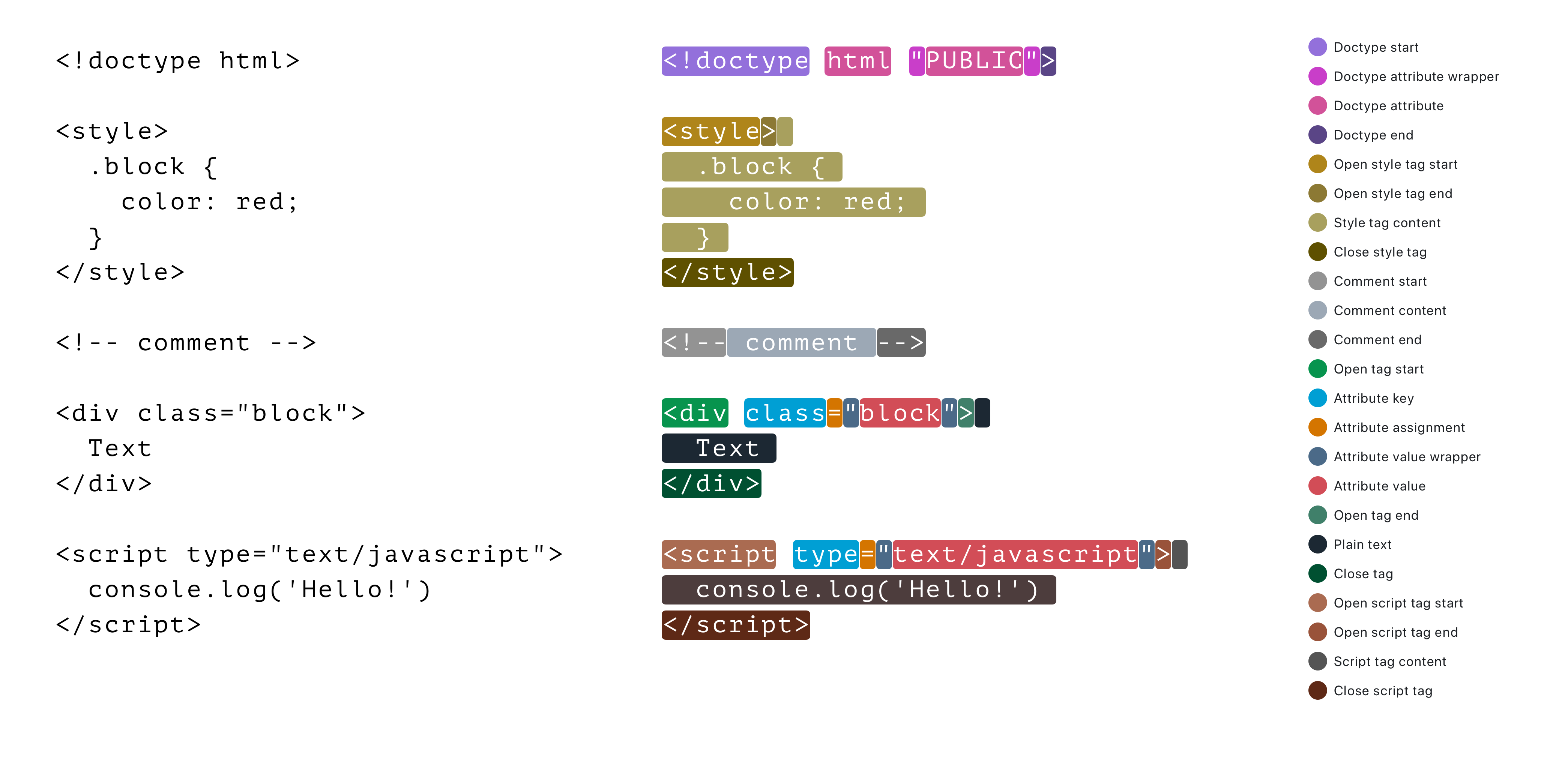mykolaharmash / Hyntax
Programming Languages
Labels
Projects that are alternatives of or similar to Hyntax
Hyntax
Straightforward HTML parser for JavaScript. Live Demo.
- Simple. API is straightforward, output is clear.
- Forgiving. Just like a browser, normally parses invalid HTML.
- Supports streaming. Can process HTML while it's still being loaded.
- No dependencies.
Table Of Contents
Usage
npm install hyntax
const { tokenize, constructTree } = require('hyntax')
const util = require('util')
const inputHTML = `
<html>
<body>
<input type="text" placeholder="Don't type">
<button>Don't press</button>
</body>
</html>
`
const { tokens } = tokenize(inputHTML)
const { ast } = constructTree(tokens)
console.log(JSON.stringify(tokens, null, 2))
console.log(util.inspect(ast, { showHidden: false, depth: null }))
TypeScript Typings
Hyntax is written in JavaScript but has integrated TypeScript typings to help you navigate around its data structures. There is also Types Reference which covers most common types.
Streaming
Use StreamTokenizer and StreamTreeConstructor classes to parse HTML chunk by chunk while it's still being loaded from the network or read from the disk.
const { StreamTokenizer, StreamTreeConstructor } = require('hyntax')
const http = require('http')
const util = require('util')
http.get('http://info.cern.ch', (res) => {
const streamTokenizer = new StreamTokenizer()
const streamTreeConstructor = new StreamTreeConstructor()
let resultTokens = []
let resultAst
res.pipe(streamTokenizer).pipe(streamTreeConstructor)
streamTokenizer
.on('data', (tokens) => {
resultTokens = resultTokens.concat(tokens)
})
.on('end', () => {
console.log(JSON.stringify(resultTokens, null, 2))
})
streamTreeConstructor
.on('data', (ast) => {
resultAst = ast
})
.on('end', () => {
console.log(util.inspect(resultAst, { showHidden: false, depth: null }))
})
}).on('error', (err) => {
throw err;
})
Tokens
Here are all kinds of tokens which Hyntax will extract out of HTML string.
Each token conforms to Tokenizer.Token interface.
AST Format
Resulting syntax tree will have at least one top-level Document Node with optional children nodes nested within.
{
nodeType: TreeConstructor.NodeTypes.Document,
content: {
children: [
{
nodeType: TreeConstructor.NodeTypes.AnyNodeType,
content: {…}
},
{
nodeType: TreeConstructor.NodeTypes.AnyNodeType,
content: {…}
}
]
}
}
Content of each node is specific to node's type, all of them are described in AST Node Types reference.
API Reference
Tokenizer
Hyntax has its tokenizer as a separate module. You can use generated tokens on their own or pass them further to a tree constructor to build an AST.
Interface
tokenize(html: String): Tokenizer.Result
Arguments
-
html
HTML string to process
Required.
Type: string.
Returns Tokenizer.Result
Tree Constructor
After you've got an array of tokens, you can pass them into tree constructor to build an AST.
Interface
constructTree(tokens: Tokenizer.AnyToken[]): TreeConstructor.Result
Arguments
-
tokens
Array of tokens received from the tokenizer.
Required.
Type: Tokenizer.AnyToken[]
Returns TreeConstructor.Result
Types Reference
Tokenizer.Result
interface Result {
state: Tokenizer.State
tokens: Tokenizer.AnyToken[]
}
-
state
The current state of tokenizer. It can be persisted and passed to the next tokenizer call if the input is coming in chunks. -
tokens
Array of resulting tokens.
Type: Tokenizer.AnyToken[]
TreeConstructor.Result
interface Result {
state: State
ast: AST
}
-
state
The current state of the tree constructor. Can be persisted and passed to the next tree constructor call in case when tokens are coming in chunks. -
ast
Resulting AST.
Type: TreeConstructor.AST
Tokenizer.Token
Generic Token, other interfaces use it to create a specific Token type.
interface Token<T extends TokenTypes.AnyTokenType> {
type: T
content: string
startPosition: number
endPosition: number
}
-
type
One of the Token types. -
content
Piece of original HTML string which was recognized as a token. -
startPosition
Index of a character in the input HTML string where the token starts. -
endPosition
Index of a character in the input HTML string where the token ends.
Tokenizer.TokenTypes.AnyTokenType
Shortcut type of all possible tokens.
type AnyTokenType =
| Text
| OpenTagStart
| AttributeKey
| AttributeAssigment
| AttributeValueWrapperStart
| AttributeValue
| AttributeValueWrapperEnd
| OpenTagEnd
| CloseTag
| OpenTagStartScript
| ScriptTagContent
| OpenTagEndScript
| CloseTagScript
| OpenTagStartStyle
| StyleTagContent
| OpenTagEndStyle
| CloseTagStyle
| DoctypeStart
| DoctypeEnd
| DoctypeAttributeWrapperStart
| DoctypeAttribute
| DoctypeAttributeWrapperEnd
| CommentStart
| CommentContent
| CommentEnd
Tokenizer.AnyToken
Shortcut to reference any possible token.
type AnyToken = Token<TokenTypes.AnyTokenType>
TreeConstructor.AST
Just an alias to DocumentNode. AST always has one top-level DocumentNode. See AST Node Types
type AST = TreeConstructor.DocumentNode
AST Node Types
There are 7 possible types of Node. Each type has a specific content.
type DocumentNode = Node<NodeTypes.Document, NodeContents.Document>
type DoctypeNode = Node<NodeTypes.Doctype, NodeContents.Doctype>
type TextNode = Node<NodeTypes.Text, NodeContents.Text>
type TagNode = Node<NodeTypes.Tag, NodeContents.Tag>
type CommentNode = Node<NodeTypes.Comment, NodeContents.Comment>
type ScriptNode = Node<NodeTypes.Script, NodeContents.Script>
type StyleNode = Node<NodeTypes.Style, NodeContents.Style>
Interfaces for each content type:
TreeConstructor.Node
Generic Node, other interfaces use it to create specific Nodes by providing type of Node and type of the content inside the Node.
interface Node<T extends NodeTypes.AnyNodeType, C extends NodeContents.AnyNodeContent> {
nodeType: T
content: C
}
TreeConstructor.NodeTypes.AnyNodeType
Shortcut type of all possible Node types.
type AnyNodeType =
| Document
| Doctype
| Tag
| Text
| Comment
| Script
| Style
Node Content Types
TreeConstructor.NodeTypes.AnyNodeContent
Shortcut type of all possible types of content inside a Node.
type AnyNodeContent =
| Document
| Doctype
| Text
| Tag
| Comment
| Script
| Style
TreeConstructor.NodeContents.Document
interface Document {
children: AnyNode[]
}
TreeConstructor.NodeContents.Doctype
interface Doctype {
start: Tokenizer.Token<Tokenizer.TokenTypes.DoctypeStart>
attributes?: DoctypeAttribute[]
end: Tokenizer.Token<Tokenizer.TokenTypes.DoctypeEnd>
}
TreeConstructor.NodeContents.Text
interface Text {
value: Tokenizer.Token<Tokenizer.TokenTypes.Text>
}
TreeConstructor.NodeContents.Tag
interface Tag {
name: string
selfClosing: boolean
openStart: Tokenizer.Token<Tokenizer.TokenTypes.OpenTagStart>
attributes?: TagAttribute[]
openEnd: Tokenizer.Token<Tokenizer.TokenTypes.OpenTagEnd>
children?: AnyNode[]
close?: Tokenizer.Token<Tokenizer.TokenTypes.CloseTag>
}
TreeConstructor.NodeContents.Comment
interface Comment {
start: Tokenizer.Token<Tokenizer.TokenTypes.CommentStart>
value: Tokenizer.Token<Tokenizer.TokenTypes.CommentContent>
end: Tokenizer.Token<Tokenizer.TokenTypes.CommentEnd>
}
TreeConstructor.NodeContents.Script
interface Script {
openStart: Tokenizer.Token<Tokenizer.TokenTypes.OpenTagStartScript>
attributes?: TagAttribute[]
openEnd: Tokenizer.Token<Tokenizer.TokenTypes.OpenTagEndScript>
value: Tokenizer.Token<Tokenizer.TokenTypes.ScriptTagContent>
close: Tokenizer.Token<Tokenizer.TokenTypes.CloseTagScript>
}
TreeConstructor.NodeContents.Style
interface Style {
openStart: Tokenizer.Token<Tokenizer.TokenTypes.OpenTagStartStyle>,
attributes?: TagAttribute[],
openEnd: Tokenizer.Token<Tokenizer.TokenTypes.OpenTagEndStyle>,
value: Tokenizer.Token<Tokenizer.TokenTypes.StyleTagContent>,
close: Tokenizer.Token<Tokenizer.TokenTypes.CloseTagStyle>
}
TreeConstructor.DoctypeAttribute
interface DoctypeAttribute {
startWrapper?: Tokenizer.Token<Tokenizer.TokenTypes.DoctypeAttributeWrapperStart>,
value: Tokenizer.Token<Tokenizer.TokenTypes.DoctypeAttribute>,
endWrapper?: Tokenizer.Token<Tokenizer.TokenTypes.DoctypeAttributeWrapperEnd>
}
TreeConstructor.TagAttribute
interface TagAttribute {
key?: Tokenizer.Token<Tokenizer.TokenTypes.AttributeKey>,
startWrapper?: Tokenizer.Token<Tokenizer.TokenTypes.AttributeValueWrapperStart>,
value?: Tokenizer.Token<Tokenizer.TokenTypes.AttributeValue>,
endWrapper?: Tokenizer.Token<Tokenizer.TokenTypes.AttributeValueWrapperEnd>
}


